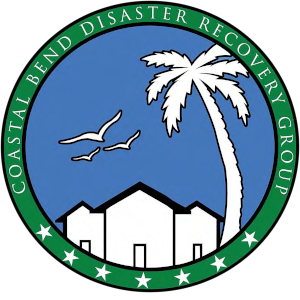August 1, 2018 | Suzanne Freeman, CC Business News
Hurricane Harvey blew Jannet Bardwell and the two grandchildren she is raising out of their home in Fulton and into a relative’s home in Arkansas. That was a year ago this month. While FEMA paid to have the damaged building demolished and removed, no money was available to replace the manufactured home in which they lived.
That’s until the Coastal Bend Disaster Recovery Group stepped in. With the help of donations, grants, and volunteers, the group was able to bring the family back into the community while working to replace their home. A new manufactured home was set up on the property and its cupboards filled with food from the Coastal Bend Food Bank this past May.
A volunteer-based nonprofit, the Coastal Bend Disaster Recovery Group was created in 2015 to address the unmet needs of Coastal Bend residents affected by disaster. It is a state- and FEMA-recognized long-term recovery organization but does not receive any local, state, or federal tax money. Seven counties in its 11-county region are included in its Hurricane Harvey recovery efforts: Aransas, Nueces, San Patricio, Refugio, Wells, Kleberg, and Bee.
Raising money and coordinating volunteers for the hundreds of homes that still need help involves a coalition of organizations working in partnership with Coastal Bend Disaster Recovery Group. Most are faith-based and include Texas Baptist Men, Presbyterian Disaster Assistance, Mennonite Disaster Service, Christian Public Services, River Conference of the Free Methodist Church USA, and Samaritan’s Purse, among many others.
“The number of faith-based organizations is overwhelming,” said retired Army Major Gen. Warren Phipps, the executive director of the Coastal Bend Disaster Recovery Group. “This kind of work takes a team. No one individual, no one group, can do this. We are always seeking out new partnerships and reaching out to other groups to bring them in to help.”
The process for helping a family begins with case management. Currently, about 14 case managers from the Coastal Bend Disaster Recovery Group and the United Methodist Committee on Relief-Rio Texas are working on more than 600 cases. The Disaster Recovery Group expects the number of case managers to grow to 52 as four more disaster case management agencies become operational in the coming days.
Of those 600 active cases, the Coastal Bend Long Term Recovery Committee is working on 144 construction projects at a cost of $4.94 million. Of the 144 projects, 79 are home repairs, 35 are replacing manufactured homes, and 30 are complete home rebuilds. The money has been identified to support these projects. The Disaster Recovery Group is always seeking volunteers skilled in carpentry, plumbing, electrical work, HVAC, and roofing to reduce construction costs. The work is underway on most of these with the first rebuild completion set for Aug. 10 in Refugio.
The entire area still has about 2,000 homeowners who need help. Besides the homeowners, a number of renters need assistance as well.
Replacing homes is not Coastal Bend Disaster Recovery Group’s only focus. Case managers refer clients to other service providers to help with health care, employment, work transportation, legal aid, or replacing household necessities lost in the disaster.
Phipps stressed that other organizations are out there working on recovery efforts as well and that his numbers only apply to groups working directly with the Coastal Bend Disaster Recovery Group. His goal is to pull all those numbers together so he can report back on results without losing sight of the ongoing need.
“We recognize the need is still there but don’t know how long this is going to take,” Phipps said. “In the meantime, we are going to celebrate every victory, every key we hand over. We have to recognize people are still suffering, too. We are looking at how we are going to tackle that and sustain the effort.”
One set of keys went to Bardwell and her grandchildren during a ribbon-cutting ceremony.
“We are so happy to be able to return back home in Texas for good,” Bardwell said. “Traveling back and forth between Rockport and Arkansas was exhausting. I’m glad we won’t have to do that anymore.”
HOW TO HELP
Volunteers are accepted through groups only. Group volunteers sign up in advance to work on particular homes and need no specific skills. Skilled labor is still needed and in high demand, said the Rev. Beth Tatum, president of the Coastal Bend Disaster Recovery Group.
“At this point, we can’t manage individual volunteers for the unskilled work,” Tatum explained, “though we do need individual volunteers who are experienced in detailed construction estimating. We especially need people with construction experience.”
Besides electricians and plumbers, roofers are another need. All the houses being repaired or rebuilt must meet windstorm insurance standards. Phipps said another concern is making sure new construction is strong enough to withstand any future storms.
“We’re looking for long-term solutions now,” he said. “It’s not triage anymore, so it takes a bit longer.”
To volunteer, visit the website at cbvc.org and fill out the volunteer form. The information goes to a volunteer manager who can direct groups into different projects. For more information, call the office in Sinton at (361) 587-5005.
